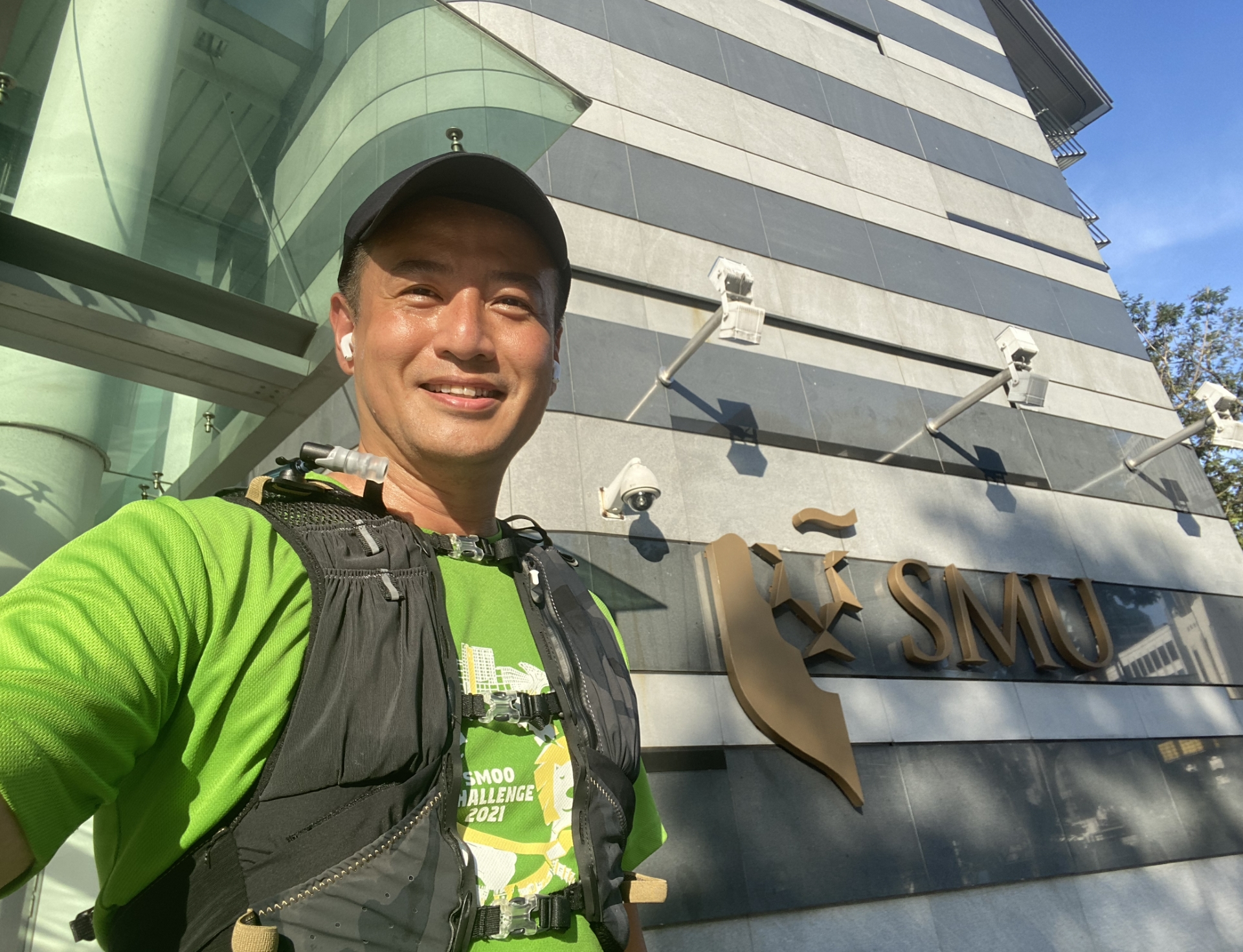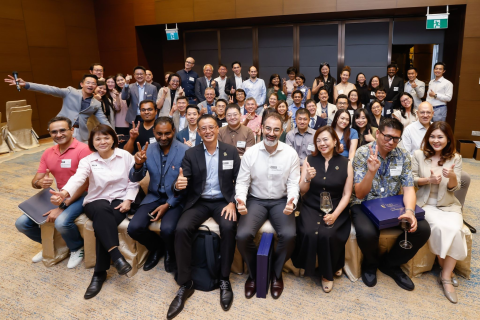
The popular stereotype of a corporate director often involves wizened C-suiters, entering into a slower phase of their careers. Terence Quek, a 2013 graduate from the pioneering SMU MSc in Communications Management cohort, envisions a different reality.
As the Chief Executive Officer of the Singapore Institute of Directors (SID), he is leading a team that is striving to uplift the directorship profession and shaping the landscape of corporate governance - a role demanding not just dynamic leadership, innovation, and adaptability, but also a profound sense of purpose.
His path to this position, however, was anything but a linear rise up the corporate ladder. Instead, it meandered through a series of professional chapters – from naval officer to serial entrepreneur – that, in retrospect, appear to be tailor-made for the complex demands of modern stewardship.
And at key junctures, SMU served as a cornerstone of the intellectual and community support that helped him advance his purpose and multiply his efforts.
Beyond the boardroom myth
Terence describes his current role in the non-profit sector as the “third season” of his professional journey—one that follows earlier chapters as a Naval Combat Officer, and later, in strategic communications, and a people and organisational development firm. It’s a deliberate pivot into a space where expectations are high and resources are limited. He hoped to draw on his experiences in the “first two seasons” of his professional life to positively impact directorship, where contrary to popular belief, the stakes are exceptionally high.
For starters, he vehemently challenges the notion that directors are simply “a bunch of retired people who meet once in a while to sign some papers”. The true picture, he insists, is one of active guardianship.
“The reality is that the director’s role is to be the steward of an organisation,” he states with conviction.
To this end, SID is continuously innovating to suit the needs of board directors. This includes updating its course delivery format with technology, refreshing its curriculum based on a recently launched Directors Competency Model, and launching a Directors accreditation programme (former SMU President Prof Arnoud De Meyer is on the programme’s Standards and Exams Board).
After all, he reminds us, modern-day directorship is evolving. Directors need to uplevel themselves so they can continue to preserve and enhance the value of their organisations to thrive into the future.
This demanding reality begs the question: what experiences prepare one to take on a lead role of an organisation that champions such principled leadership? The answer lies partly in the seemingly disparate chapters that came before.
“My days in the Navy instilled in me the discipline to keep learning so as to progress and to perform better,” shares Terence.
“Subconsciously, lifelong learning became very much a part of my life.”
Following his military service, the leap into entrepreneurship demanded a completely different skillset: agility, risk assessment, and the relentless pursuit of value creation. Running businesses — including a strategic communications consultancy with international clients — exposed him to the sharp end of market demands and the constant need for innovation. It was during this period that he felt a crucial gap in his own knowledge base.
“While I was able to deliver value,” he recalls of his entrepreneurial phase, “there was a nagging feeling that I needed something higher than the basic degree I only had then, to bolster my professional credibility.”
A world beyond the classroom
The ambition to scale and compete more effectively highlighted the need for a deeper, more complex foundation of knowledge. This serendipitously converged with the launch of SMU's inaugural Master of Science in Communications Management (MCM) in 2012.
At that point in time, MCM programme’s design, with modules taught across Singapore, Europe, and the US, wasn’t just academically appealing; it was a promise of global perspective and the challenge of adapting to diverse environments. As Terence aptly recalls, “it was essentially an ‘MBA’ combined with ‘Corporate Communications’ at a higher level”.
Stepping into that first cohort meant going back to school after years at work, navigating the intensity of a new curriculum — alongside a diverse group of peers: The programme featured segments conducted at SMU; at Università della Svizzera italiana (USI) in Lugano, Switzerland; and UCLA Anderson School of Management in Los Angeles, USA. The experience was demanding, but the vibrant discussions and collaborative work provided unexpected depth.
“I appreciated that I had classmates (mostly Europeans) from USI, and that the programme was conducted in three geographically distinct locations with faculty from three premier institutions, allowing me to benefit from the Asian, European and American perspectives.”
“Intense debates in class with course mates whose companies were featured in the case studies” offered real-world context and widened his horizons. This rigorous intellectual environment, coupled with the exposure to varied international viewpoints, helped him appreciate the power of diversity of thought and lived experiences.
Navigating the squalls of leadership
Leadership, in Quek’s experience, is less about sailing smoothly through fixed roles and more about constant course correction. Helming SID presents daily challenges, for him, but he sees this not as adversity to be avoided, but as an essential condition for growth.
“If I am not solving a challenge, or if no one in my team is coming to me with challenges they can’t solve, then it could mean we are not growing, or that something is terribly wrong,” he posits.
Confronted with difficult situations, like a dissatisfied client, his response is intentional, born from experience: setting aside emotion to “focus on the problem at hand”, collaborating with his team, and communicating clearly.
This systematic yet empathetic approach is a hallmark of his style of leadership forged across diverse high-pressure environments. He notes that learning from different people has taught him “not to be too quick to judge”.
As Terence adds: “Being open minded and treating everyone with respect (regardless of their age or background) allowed me to harness the power of people and in the process, learn so much more about the world and myself.”
Being respectful, to Terence, also extends to being grateful and to give back.
“I recall the scholarship interview helmed by the programme director at that time, who asked why the University should award me a scholarship to pursue the MSc,” says Terence.
“I told the panel that should I be given the award, I would give back to the University. I kept my word, and since the day I graduated from MCM to now, I’ve found different ways to give back to the University.”
After he graduated from MCM, he co-founded the MCM Alumni Chapter with the support from SMU Office of Alumni Relations, served on the Lee Kong Chian School of Business Alumni Board, volunteered as SMU Alumni Ambassador, and co-chaired the Alumni Advisory Council.
While serving on the SMU Alumni Fundraising Committee, Terence mooted the idea of SMU Imagine Better book and contributed towards its donation drive which resulted in raising more than $250,000 for SMU. He also accepted the invitation to be an Ambassador for SMOO Challenge for three consecutive editions where he walked, ran, and cycled a combined distance of more than 600km and fundraised more than $20,000. Being part of the SMU Alumni Philanthropy Council, Terence also donated towards the SMU Alumni Infinity Fund and SMU Alumni Silver Jubilee Fund. Perhaps the most telling example of SMU’s impact on his sense of purpose was his decision to mark his 50th birthday with a networking fundraising event to launch the SMU Pegasus Overseas Exchange Grant, raising more than $56,000 for a perpetual fund to support students who might otherwise be unable to access international learning opportunities due to financial constraints. While he continues to be part of the SMU Alumni Philanthropy Council, he is in the midst of setting up the SMU Leading Executives and Directors Alumni Group to rally SMU alumni who are senior executives and board directors to support SMU’s needs.

Such sustained engagement underscores the depth of his gratitude to his alma mater and the powerful sense of community that continues to define him. He feels indebted to SMU and its alumni network which he felt had supported him throughout his career.
“Throughout more than a decade as an alumnus and contributing in various ways, I have made many good friends, some of whom were not from my own MCM programme,” says Terence.
“The network that I grew through my active participation in the University allowed me quick access to resources, knowledge, and connections. The common affiliation to SMU was a good icebreaker and laid the foundation for trust to be developed.”
His commitment to being a “constant steward” extends to his philosophy of lifelong learning. In a world of accelerating change, particularly in the digital and sustainability realms that are so critical for modern boards, learning is the only way to progress.
“The moment I stop learning,” he states plainly, “I won’t be staying at the same place. I would actually be falling behind.”
“Having more directors who are ethical and effective in their practice will have a positive impact on a sustainable future for all of us,” he affirms, linking individual growth to collective well-being.
Finding true north: moments of reset
In moments away from the demands of his work and community service, Terence finds perspective in the quiet vastness of nature — travelling, hiking, or diving — allowing for reflection under an open sky. “Having some ‘me’ time out under an open sky or floating on the sea allows me to free my mind and do some deep thinking,” he shares. These periods of quiet reflection offer perspective amid his taxing schedule.
Ultimately, Terence Quek's journey illustrates that the path to impactful leadership can be forged through diverse experiences, each contributing a vital piece to the puzzle. His personal credo distils this hard-won wisdom: “Respect all. Act with integrity. Take courage. Pursue excellence. Be purpose driven. Be kind. For ‘This, Too, Shall Pass’.”
It’s a fitting adage for a leader who has navigated many seas and is now focused on supporting apex-level leaders to be champions of good corporate governance and to steer their organisations towards a more sustainable future.
The SMU edge: More than a degree
Terence Quek’s experience at SMU equipped him with a toolkit, enabling him to lead in diverse settings:
Global perspective, sharpened skills
The international MCM programme structure delivered academic depth and a breadth of viewpoints, instantly boosting professional credibility. As Terence remarks: “Needless to say, the whole experience was very global.”
Commitment to community
SMU instilled a philosophy of lifelong learning, the belief in the power of community, and a drive to give back, shaping his path of purposeful stewardship. For example, while being part of the Alumni Fundraising Committee, Terence mooted the idea of the SMU Imagine Better book which through the network of alumni, raised more than $250,000 for students in need.
Ongoing relevance:
SMU’s ever-evolving ecosystem keeps him closely connected to the latest developments at the intersection of academia and industry—an edge that’s vital for staying ahead. His pursuit of the Executive Diploma in Directorship, along with programmes like the Digital Finance Leadership Programme, reflects a thoughtful commitment to continuous growth - aligned with his professional aspirations and expanding his worldview.


